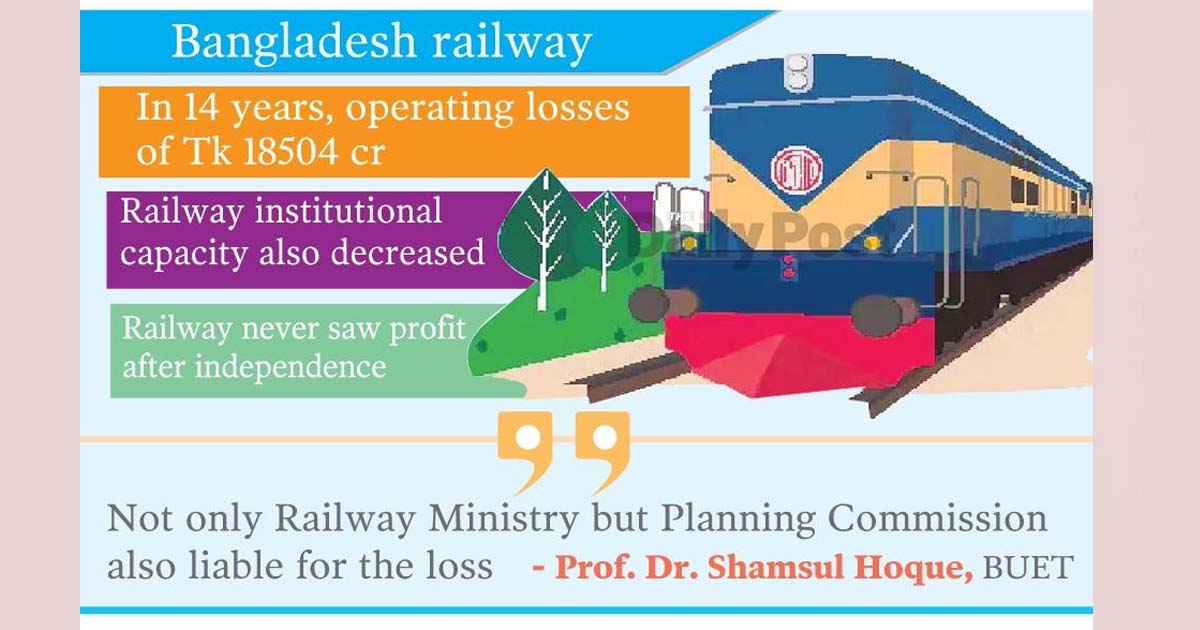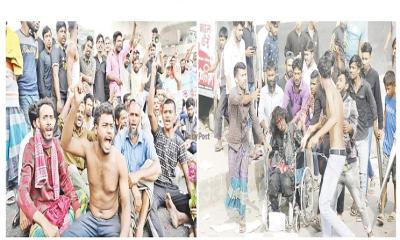- In 14 years, operating losses of Tk 18504 cr
- Railway never saw profit after independence
- Railway institutional capacity also decreased
Rail is the first choice of most people in the country for relatively safe and comfortable travel. Due to high passenger pressure, train tickets on various routes are sold out quickly. However, despite no increase in railway service quality and revenue, the operating expenses of the company are increasing year by year. As expenditure is twice as much as income, the loss scale of railways is heavy. In the last 14 years, a loss of Tk18 thousand 504 crore has been incurred in the railway management sector alone. If you add the money for buying coaches and engines, the government's investment in various projects, the amount of loss will be several times more, said the concerned.
Officials of the relevant ministries say the railway has never seen profit after independence. Along with the losses, the institutional capacity of the railways also decreased. 25 years ago, railways had to spend 96 paise to earn Tk 1.
At present, the railway is spending Tk 2.78 to earn Tk 1. That is, the cost of the railway has increased several times over the income. As a result, the money invested by the government is not coming back. Rather, the company is not able to raise even half of the train operating expenses.
Communication and transport experts say that due to various irregularities, corruption, and mismanagement, besides increasing the operational cost of railways, the losses are also increasing. It will not be possible to reduce the losses of the railways unless the irregularities are stopped and proper management of resources is done. To reduce the losses, they suggested to prevent corruption as well as to increase the number of goods trains.
In the last 10 years, more than Tk 72 thousand crore have been spent on various projects for the development of railways. New coaches and engines were purchased along with the construction of new railways. However, despite the increase in investment, the quality of service has not increased.
According to Railway Ministry sources, the revenue of Railways in the 2022-23 financial year is Tk 1 thousand 783 crore. However, the operating expenses have been Tk 3 thousand 307 crore. In the last financial year, the total operating loss of the railways was Tk 1 thousand 524 crore.
In the previous financial year 2021-22, the government spent Tk 16337 crore on railways. Out of this, investment in railway construction and purchase of coach-engines is Tk 12575 crore.
And the cost of rail operating has been Tk 3762 crore. On the contrary, the income was 1 thousand 466 crore. That year there was a record operating loss of Tk 2296 crore.
In the financial year 2020-21, the operating loss of the railways has been Tk 2100 crore. But even 25 years ago, Bangladesh Railways used to have some money surplus after covering all the expenses of train operation with the income of passenger and goods transportation. In the fiscal year 1998-99, the operating surplus of the railways was about Tk 18.5 crore.
At present, the surplus is far from over, the loss has exceeded thousands of crore of taka.
Railway officials said that during the period of Awami League government from 2009 to 2023 in 14 budgets, Tk 1 lakh 21 thousand 10 crore were allocated for railways. Railways lost Tk 18504 crore in 14 years in train operation. According to sources in the Ministry of Railways, the management losses of the railways have more than doubled in just 10 years. In the financial year 2015-16, against the income of Tk 1034 crore of Railways, the operating expenditure was Tk 2337 crore.
That is, the operating loss that year was Tk 1303 crores.
In the financial year 2014-15, the total income was Tk 956 crore. Tk 1878 crore was spent. The loss was Tk 922 crore.
In the fiscal year 2013-14, the revenue of Railways was Tk 931 crore 93 lakh. Tk 1734 crore was spent. The loss was Tk 803 crore.
In the financial year 2012-13, the income was Tk 804 crore. Tk 1685 crore was spent. The loss was Tk 881 crore.
In the financial year 2011-12, the income was Tk 629 crore. 1679 crore was spent. The loss was Tk 1050 crore. In that financial year, the loss of the railway exceeded thousands of crore of taka.
Before that, there was a loss of Tk 958 crore in the financial year 2010-11.
To reduce these losses, passenger and freight fares were increased by 50 percent from October 1, 2012. Then when the 8th National Pay Scale was introduced, the administrative expenses increased. In this argument, in February 2016, the railway fare was increased from 7 to 9 percent. However, although the income increased slightly due to the rent increase, the loss did not decrease in the end.
In such a situation, a few days ago Railway Minister Zillul Hakim indicated to increase the fare of the railway again. Despite continuous losses, expenditure on railway development has increased in the last five years. Tk 79887 crore have been spent during this time. And Tk 61821 crore have been spent on development projects. The remaining Tk
18066 crore is spent on railway management. Against this, the income was Tk 6449 crore.
Bangladesh University of Engineering and Technology (BUET), Accident Research Institute (ARI) assistant professor and transportation expert Kazi Saifun Newaz said rail is a vehicle of interest to people. To reduce the losses, besides reducing the corruption, it is necessary to reduce the excess cost. Necessary steps should be taken in this regard. Income should increase. To increase the income, transportation of goods should be increased. If necessary, one or two goods coaches should be added to each passenger train. It should be ensured that the government gets the standing ticket money.
He said, there is a tendency in railways to bill Tk 50 for work of Tk 10 in some cases. Purchases including machinery and parts should be properly audited. Because shopping costs are shown higher. If these irregularities are stopped, efforts can be made to make the railway profitable.
Transport expert and BUET Professor Dr. Shamsul Hoque said that although a huge amount of money was invested in the railways in the past era, the organization could not play a role in improving the quality of services. There is a lack of coordination between different sections. In addition to increasing the transportation of goods, it is necessary to increase income through sound resource management. Simultaneously, train speed should be increased and passenger service should be improved. But the railways cannot do this. Failure to prioritize these issues will increase losses. Not only the railways is responsible for this, but the planning commission is also responsible.
Ashish Kumar Dey, general secretary of the National Committee for the Protection of Naval, Road, and Railways (NCPSRR), said that it is not possible to reduce the losses of railways unless irregularities are stopped and resources are properly managed. Therefore, if the service quality is improved, corruption and waste can be stopped, and the railways can avoid losses.
Former Railways Minister Nurul Islam Sujan said that the Awami League government has implemented extensive programs for the development of railways after coming to power. Many development projects are still being implemented. However, it is not possible to get the benefits of this huge investment in railways quickly. It is an ongoing process. It takes time to reap the benefits. After the completion of the ongoing projects, railway services will increase as well as losses will be reduced.
Railway Minister Zillul Hakim said that the cost of railways has increased due to the increase in the cost of police, security forces, schools, and hospitals. Because of that, the losses of the railways are increasing slightly. Apart from this, the railways are incurring losses due to various mismanagement. The average daily income of a passenger train is Tk 3.5 lakh. But the daily average income of a freight train is around Tk 7-8 lakh. More than 350 passenger trains run daily but only 20-25 freight trains run. Due to this, the income of the railway is decreasing. Various steps are being taken to make the railway profitable.
ARS






